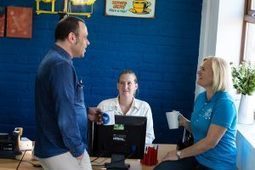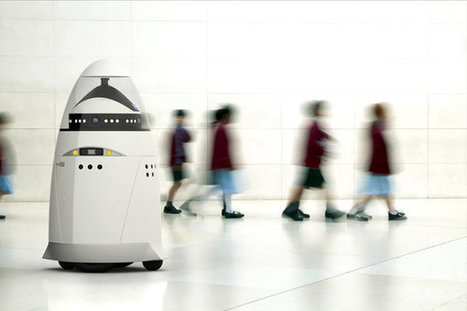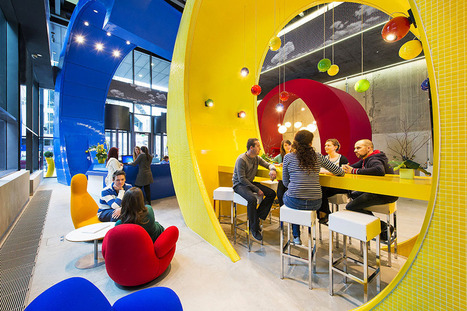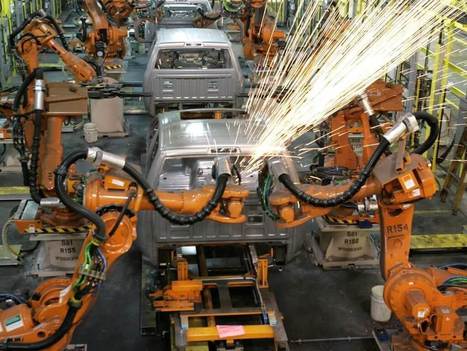 Your new post is loading...

|
Scooped by
Edumorfosis
February 3, 2017 9:46 AM
|
Never before have we seen so much creativity, innovation, and evolution. Trend watchers are going berserk with all the cool new ideas being born every minute, and futurologists are seeing their predictions come true sooner than expected. The second machine age is here, and what an exciting time it is! But running a competitive business is challenging as we tumble from one paradigm to another.
This blog is not about predictions for 2017. Instead, I highlight seven trends that will step closer to the mainstream in 2017, changing the world and the way we do business.

|
Scooped by
Edumorfosis
February 2, 2017 12:23 PM
|
Workers are switching careers after being made redundant, want to earn more money, or are bored in their job, new research shows.
A study by the Co-op found that more than half of people over the age of 50 have had at least three different jobs.

|
Scooped by
Edumorfosis
February 2, 2017 8:52 AM
|
The White House published a report last month that reinforced this view. Some of the headline stats:
- 83 percent of the jobs where people make less than $20 per hour will be subject to automation or replacement.
- Between 9 percent and 47 percent of jobs are in danger of being made irrelevant because of technological change, with the worst threats falling among the less educated.
- Between 2.2 and 3.1 million car, bus and truck driving jobs in the U.S. will be eliminated by the advent of self-driving vehicles.

|
Scooped by
Edumorfosis
February 1, 2017 8:48 AM
|
In 2015, 38% of workers in management, business, and financial operations occupations, and 35% of those employed in professional and related occupations, did some or all of their work from home on days they worked, the U.S. Bureau of Labor Statistics reported today. Workers employed in other occupations were less likely to work from home on days they worked. These and other results from the American Time Use Survey (ATUS) were released today. These data include the average amount of time per day in 2015 that individuals worked, did household activities, and engaged in leisure and sports activities. Additionally, measures of the average time per day spent providing childcare—both as a primary (or main) activity and while doing other things—for the combined years 2011-2015 are provided. For a further description of ATUS data and methodology, see the Technical Note.

|
Scooped by
Edumorfosis
February 1, 2017 6:49 AM
|
We know that the jobs of tomorrow will require skills steeped in technology. We also realize that today’s students live surrounded by technology that wasn’t a reality for the generations before them. Technology can improve how students learn both in and out of the classroom. We truly believe that the startups that have been and will be a part of the AT&T Aspire Accelerator will be the individuals helping to shape what the future of edtech will look like, and we’re excited to be along for this important ride.

|
Scooped by
Edumorfosis
January 31, 2017 12:57 PM
|
Disruptive technologies are now dictating our future, as new innovations increasingly blur the lines between physical, digital, and biological realms.
Robots are already in our operating rooms and fast-food restaurants; we can now use 3D imaging and stem-cell extraction to grow human bones from a patient’s own cells; and 3D printing is creating a circular economy in which we can use and then reuse raw materials.
This tsunami of technological innovation will continue to change profoundly how we live and work, and how our societies operate.
In what is now called the Fourth Industrial Revolution, technologies that are coming of age — including robotics, nanotechnology, virtual reality, 3D printing, the internet of Things, artificial intelligence, and advanced biology — will converge.

|
Rescooped by
Edumorfosis
from Educación a Distancia y TIC
January 31, 2017 7:25 AM
|
In the last couple of years, I have spoken to many corporate Learning and Development practitioners about how they may support and enable opportunities for their workforce to learn collaboratively with each other in and during the flow of their every day work. That is, “social learning’. During these conversations, I noticed that there were some myths about social learning that I would like to dispel.
Via LGA

|
Scooped by
Edumorfosis
January 30, 2017 6:46 AM
|
Building software for startups is a huge challenge. Not because writing the software itself is that hard, but most startups have managed to create the least optimal places to do work. In my 10+ years of experience as a software engineer at startups, I cannot trust employers to provide me with an adequate work environment, and this holds me back from doing the best possible work for them. I am an ambitious, driven individual, and I want nothing more than to provide the places I work with my best possible output. I will give whatever company I am working at 110%. Most of the places I have worked have done a great job at preventing me from doing this. That’s why from here on out, I am taking a stand and drawing a line in the sand. Henceforth I will only work in a “remote” arrangement.

|
Scooped by
Edumorfosis
January 29, 2017 8:00 PM
|
YOUNG PEOPLE AT work are taking responsibility for their own ability, which may not be a good thing say researchers at a university in Sweden.
According to researchers at Sahlgrenska Academy at Gothenburg University, young people regard themselves as being responsible for acquiring new knowledge and motivation in the workplace.

|
Scooped by
Edumorfosis
January 29, 2017 10:13 AM
|
The world of work is changing faster and more drastically than at perhaps any other time in recent history. According to research from the World Economic Forum, 35% of the skills necessary to thrive in a job today will be different five years from now.
How can we prepare for a workplace of the future if we’re not quite sure what it will look like? What skills or expertise should students focus on acquiring today if they want to succeed tomorrow? We spoke with five experts from the Forum’s Young Global Leaders community to get their opinion.

|
Scooped by
Edumorfosis
January 28, 2017 7:20 PM
|
The idea of humans losing their jobs to robots/computers is currently the most virulent of all the various techno-angsts going around.
It’s a valid worry. While the exact percentage estimates vary, it’s generally understood that many of today’s jobs will soon have robots filling them instead of people. Existing robot doctors, lawyers, chefs and even journalists may not perform as well as their human counterparts yet, but they will inevitably improve—and dramatically so in many cases. Humans, not so much.

|
Scooped by
Edumorfosis
January 28, 2017 7:12 PM
|
If you’re considering a new career, first consider whether or not the job prospect in your crosshairs will even exist in a couple decades. Indeed, a recent Oxford University study identified more than 700 jobs under threat by an increasingly automated workforce. The following are among the most at-risk.

|
Scooped by
Edumorfosis
January 27, 2017 11:29 AM
|
Who wouldn’t want to work from home? In addition to giving you the freedom to work in your pajamas, telecommuting saves money and frustration, cutting out both the commute and dry-cleaning costs (to say nothing of the savings to your fancy coffee budget). But working from home isn’t without its pitfalls.
|

|
Scooped by
Edumorfosis
February 3, 2017 9:41 AM
|
If statistics are to be believed, this business model is likely to change the face of employment over the next few years. As a nation, we are now moving away from the traditional concept of work being something that takes place during designated hours in a specific setting to one in which work and life are increasingly integrated.
This can have its drawbacks, with people who work from home often complaining that their work now invades every aspect of their lives rather than existing within set parameters. There is a sense of being ‘on call’, yet many people are choosing to work from home because it conveys significant benefits compared with being confined to an office.
Employers must sit up and take notice. There are now 1.5 million home workers in the UK, of which 900,000 are women. This is not to mention the other 4.2 million who work from home some of the time.

|
Scooped by
Edumorfosis
February 2, 2017 8:57 AM
|
Working more than 39 hours a week is bad for your mental and physical health, a new study says.
Australian National University researchers are calling for a drop in the the internationally-accepted 48-hour work week, agreed to about 80 years ago to avoid worker burn-out.
They've published a research paper, 'Not all hours are equal: could time be a social determinant of health?', after examining the work lives of 8000 adults.

|
Scooped by
Edumorfosis
February 1, 2017 5:09 PM
|
Even if those jobs returned, a high school diploma is simply no longer good enough to fill them. Yet rarely discussed in the political debate over lost jobs are the academic skills needed for today’s factory-floor positions, and the pathways through education that lead to them.
Many believe that the solution is for more Americans to go to college. But the college-for-all movement, which got its start in the 1970s as American manufacturing began its decline, is often conflated with earning a bachelor’s degree.

|
Scooped by
Edumorfosis
February 1, 2017 8:22 AM
|
Working from home is increasingly the dream of many a harried employee.
But it’s hard to find legitimate work-from-home opportunities that aren’t too-good-to-be-true scams.
FlexJobs, a company that vets all types of flexible job listings including part-time, telecommuting and freelance, today releases the top 100 companies offering telecommuting opportunities in 2017.

|
Scooped by
Edumorfosis
January 31, 2017 1:09 PM
|
With college tuition soaring nationwide, many Americans don’t have the time or money to earn a college degree. However, that doesn’t mean your job prospects are diminished. Increasingly, there are many companies offering well-paying jobs to those with non-traditional education or a high-school diploma.
“When you look at people who don’t go to school and make their way in the world, those are exceptional human beings. And we should do everything we can to find those people,” said Google’s former SVP of People Operations Laszlo Bock.
“Academic qualifications will still be taken into account and indeed remain an important consideration when assessing candidates as a whole, but will no longer act as a barrier to getting a foot in the door,” added Maggie Stilwell, Ernst and Young’s managing partner for talent.

|
Scooped by
Edumorfosis
January 31, 2017 8:47 AM
|
Estamos en transición hacia una nueva conciencia humana, la conciencia humana evoluciona y nos ha tocado vivir en una época de evolución hacia una nueva forma más sofisticada de enfrentarse al mundo.
No podemos predecir el futuro pero todo apunta a que vienen años de avances tecnológicos que ni imaginábamos hace 5 años, de nuevas tendencias en todos los ámbitos, de coches voladores, de robots de compañía, de economía colaborativa, de renta básica, de cyborgs, de ingeniería genética, inteligencia artificial, de Smart Cities … pero lo realmente apasionante de todo esto es que está cambiando el concepto de lo que implica ser humano. Lo dicho, una nueva conciencia humana.

|
Scooped by
Edumorfosis
January 31, 2017 7:21 AM
|
Business is changing. The Towards Maturity Benchmark Report notes that 72% of CEOs believe the next three years will be more critical for their industry than the last 50. The challenge to Learning & Development teams is how they’re going to help their CEO and internal customers stay smart in uncertain times. We need to shift to a model of continuous and curated learning in the workplace. Here’s why continuous curated content matters to businesses, and how Learning Professionals can make a business case for it.

|
Scooped by
Edumorfosis
January 29, 2017 8:31 PM
|
Telecommuting sounds like a dream. Instead of sitting in traffic, you get to spend an extra hour in bed. The coffee is better, you don't have to listen to the inane jabbering of your coworkers, and if you get through your quota of work early, you're done for the day, instead of hanging around wasting time to fill up the remaining hours. And while that may be true for some lucky folks, the reality is quite different, especially when it comes to pay and long hours.
"Rather than enhancing true flexibility in when and where employees work," write the authors of a new study, "the capacity to work from home mostly extends the workday and encroaches into what was formerly home and family time."

|
Scooped by
Edumorfosis
January 29, 2017 11:00 AM
|
¿Quieres mejorar la manera en que tus alumnos aprenden? ¡Cambia tu forma de evaluar! En la actualidad existen infinidad de herramientas para realizar una evaluación formativa diferente al examen y que te harán la docencia mucho más práctica, rápida y fácil.

|
Scooped by
Edumorfosis
January 29, 2017 9:01 AM
|
What’s to become of the traditional work office?
Is it possible that communications tools like Skype, Zoom.us and Google Hangouts will have the effect of making communal office spaces obsolete?
Is the day coming when organizations will redeploy workers to home offices – where they’ll have no commute, and the freedom to work all day in play clothes?
A few years ago, researchers at iconic furniture maker, Herman Miller, began a deep-dive into the future of the global workplace driven by the desire to answer questions like these. Clearly, technology already makes it possible for many people to work away from conventional offices. The question is whether that’s ultimately the best thing for workers, not to mention the companies that employ them.

|
Scooped by
Edumorfosis
January 28, 2017 7:18 PM
|
In my previous post, I looked at how everything old is new again in regards to fears about automation taking human jobs. It’s a fear that has existed for decades at least and is now once again in high gear thanks to recent advances in robots and artificial intelligence. Robots will mostly take over the jobs humans hate doing anyway
Many robotics and AI experts aren’t too concerned with the long term, believing that machines will ultimately elevate the type of work that humans do. But there does seem to be a consensus building that societies are going to have to do something to manage the pain in the near term.
A large group of workers—mainly those whose work involves routine tasks—will indeed be displaced, so it might be wise to plan for it now.

|
Scooped by
Edumorfosis
January 28, 2017 7:08 PM
|
Let’s start with the good news: manufacturing is returning to North America. It is called “re-shoring” and is happening for several reasons. Chief among these is that labour costs in Canada and the United States are becoming relatively more competitive as the Chinese economy soared and wages there gradually caught up to more developed economies. But there are other factors at play here, too.
In North America, corporate tax rates have become more globally competitive, as has the cost of energy. Land is also far cheaper in North America. To find 500 acres for a large manufacturing facility in Alberta, you look out a window. In Guangzhou? Even five acres could be a challenge. When you also consider the additional cost of shipping goods from Asia to North America, the case for simply making it here becomes even stronger.
|

 Your new post is loading...
Your new post is loading...








![[PDF] Work at home in 2015 | Edumorfosis.Work | Scoop.it](https://img.scoop.it/TIV_f3fAyM1X1YS7dUvk6zl72eJkfbmt4t8yenImKBVvK0kTmF0xjctABnaLJIm9)

























